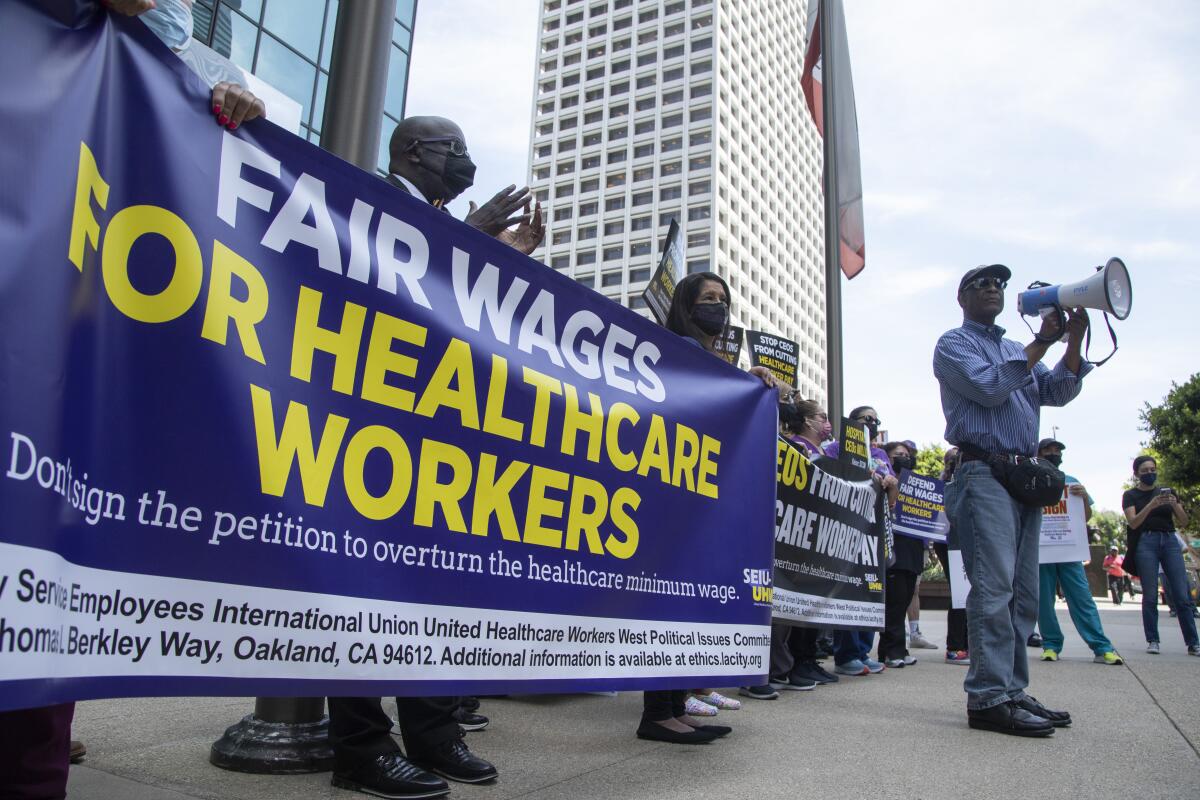Higher wages for workers at private hospitals? Voters in Duarte and Inglewood to decide

- Share via
Voters in the cities of Duarte and Inglewood will decide next month whether to boost the minimum wage to $25 an hour for a range of workers at privately owned hospitals and dialysis clinics.
The wage measures have been championed by the healthcare workers union SEIU-UHW, which has been pushing for a $25 hourly minimum at health facilities in many cities in Los Angeles County. SEIU-UHW leaders have argued that the wage hikes are crucial to retain workers who have felt devalued during the pandemic.
“If the hospital was providing me more money, I wouldn’t leave,” said Victor, an emergency room technician at Centinela Hospital Medical Center in Inglewood who asked to be identified only by his first name because of concerns about employer retaliation. “I like this hospital. I know this hospital like the back of my hand.”
The Inglewood hospital pays him $21.50 an hour, plus added pay for night shifts, he said. To make ends meet, he said he had been juggling two jobs, sometimes sleeping in his car, and nodding off during T-ball games when his son wasn’t at bat. When another job paying $25 an hour became available, he decided to put in his notice to leave, he said.
“I’d rather help this community,” Victor said. “But I have to take care of myself and my family.”
An L.A. measure boosting minimum wage for thousands of healthcare workers is likely to be either repealed or put on the ballot, city officials say.
Union officials hope that local measures could help pave the way for a statewide minimum wage for workers in such facilities. An attempted statewide deal between SEIU-UHW and the California Hospital Assn. collapsed in August, amid concerns from other unions that said the agreement exchanged higher pay for undermining earthquake standards at hospitals.
Passing the measures in Duarte and Inglewood would mean “an immediate life transformation for many of these workers,” freeing them to stop shouldering more than one job and possibly continue their education, said SEIU-UHW spokesperson Renée Saldaña. It would “keep healthcare workers in their jobs, in these communities, in these facilities, to improve patient care.”
SEIU-UHW has been facing off with a coalition of hospitals and other opponents who have tried to thwart their efforts. Wage increases are now on ice in Los Angeles and Downey, where local officials had voted to pass them into law, after hospital groups gathered enough signatures to force the wage increases to be put on the ballot instead.
Another referendum effort targeting a wage increase in Long Beach was still having signatures tallied as of early October, according to the city clerk’s office.
If voters approve the wage measures in Duarte or Inglewood next month, they would be the first to go into effect in L.A. County, union officials said.
Wages for healthcare professionals have been “relatively flat” in recent years, “despite their increased demands and stressors in the work environment,” said Christopher M. Whaley, a health economist at the Rand Corp. and professor at the Rand Pardee Graduate School. As a result, “there’s been a push to recognize, financially, a lot of the burdens that they had during the pandemic.”
The wage measures up for a vote in Inglewood and Duarte cover a range of employees, including security guards, clerical workers, nursing assistants, aides, housekeepers, groundskeepers and others who work at privately run hospitals, psychiatric facilities, dialysis centers, and clinics that are part of private hospitals.
In Duarte, that includes workers at the cancer treatment center City of Hope; in Inglewood, it would cover workers at Centinela Hospital Medical Center as well as seven dialysis clinics, according to SEIU-UHW. (City of Hope declined to comment on the measures, while Centinela Hospital referred questions to a representative for the campaign opposing them.) The two measures would affect nearly 700 SEIU-UHW members, as well as an unknown number of workers who are not in the union, Saldaña said.
Whaley said that physicians and many other hospital workers are well above the $25 hourly minimum sought by the union, so the wage hikes would chiefly affect lower-earning workers, including support staff in hospitals. Boosting wages could be “a tool to increase the ability to attract and retain workers, which in this environment is hard to do,” he said.
But it could also add to facility expenses — and the money “does have to come from somewhere,” which could prompt a push to raise prices or reduce services, Whaley said. The ballot measures state that private hospitals and other covered employers cannot pay for the wage increases by reducing vacation or other benefits, cutting worker hours or laying off covered employees.
Hospital groups have argued that the wage increases are arbitrary and unfair because they single out only some health facilities. In Duarte and Inglewood, the majority of health facilities are not covered by the measure, according to the California Hospital Assn.
LeadingAge California President and CEO Jeannee Parker Martin, whose group represents facilities that house and care for older adults, said none of their members in Duarte and Inglewood will be required to raise wages under the two measures, but they would face “a whole host of unintended consequences,” including “intensifying the already critical staffing shortages.”
Local hospitals are suing Los Angeles over its measure to bolster the minimum wage to $25 an hour. They argue it unfairly covers only some facilities.
Nursing homes and other senior facilities would have to compete for the same workers who would be making at least $25 an hour at private hospitals, but would struggle to pay increased wages while relying on government reimbursements, she said.
“It’s not that we don’t all want higher wages,” said Martin, whose group is part of the coalition opposing the wage measures. “It’s that the reimbursement system has not kept up.” If the wage measures pass, “we’re not really solving a problem by bringing in more staff. We’re moving the staff to hospital-based facilities.”
In reaction to questions about the limited reach of the wage measures, union officials said they did not include public hospitals because cities could not set wages for county or state workers. SEIU-UHW had been pursuing a separate measure to help increase wages to $25 hourly at community clinics — a state bill that did not make it out of the Legislature this year.
Opponents have also warned that pay increases could force some hospitals into financial jeopardy. In Los Angeles, Barlow Respiratory Hospital was among a group of facilities suing over a city measure to boost wages to at least $25 an hour, arguing that it “may very well cease to exist” if the wage increases are required there.
Saldaña said hospital companies can generally afford to invest more in workers, but also emphasized that the Duarte and Inglewood ballot measures include a provision allowing employers to seek a one-year waiver from the wage requirements in court if they can show that boosting wages would raise serious doubts about their ability to operate.
Adena Tessler, regional vice president for L.A. County at the Hospital Assn. of Southern California, argued that “the language is incredibly vague,” with “little guiding language in the initiative about what the process would entail.”
As of early October, hospitals and health systems opposing the Inglewood and Duarte measures had reported contributing more than $3 million to the Inglewood and Duarte campaigns, while SEIU-UHW had contributed roughly $1.5 million to back the two measures. Voters will weigh in on the Duarte and Inglewood measures on Nov. 8.
More to Read
Sign up for Essential California
The most important California stories and recommendations in your inbox every morning.
You may occasionally receive promotional content from the Los Angeles Times.
















